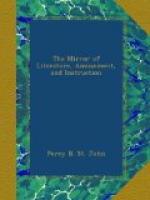“Eliza’s mind was cultivated, but the effects of this art were never perceived. It had done nothing more than embellish nature; it served in her, only to make the charm more lasting. Every instant increased the delight she inspired; every instant rendered her more interesting. Such is the impression she had left in India; such is the impression she made in Europe. Eliza, then, was very beautiful? No, she was simply beautiful; but there was no beauty she did not eclipse, because she was the only one that was like herself.
“Eliza has written; and the men of her nation, whose works have been the most abounding in elegance and taste, would not have disavowed the small number of pages she has left behind her.
“When I saw Eliza, I experienced a sensation unknown to me. It was too warm to be no more than friendship; it was too pure to be love. Had it been a passion, Eliza would have pitied me; she would have endeavoured to bring me back to my reason, and I should have completely lost it.
“Eliza used frequently to say, that she had a greater esteem for me than any one else. At present I may believe it.
“In her last moments Eliza’s thoughts were fixed upon her friend; and I cannot write a line without having before me the monument she has left me. Oh! that she could also have endowed my pen with her graces and her virtue!—Methinks, at least, I hear her say—’That stern muse that looks at you, is History, whose awful duty it is to determine the opinion of posterity. That fickle deity that hovers o’er the globe, is Fame, who condescended to entertain us a moment about you; she brought me thy works, and paved the way for our connection by esteem. Behold that phoenix immortal amidst the flames: it is the symbol of Genius, which never dies. Let these emblems perpetually incite thee to shew thyself the defender of humanity, of truth, and of liberty.’
“Eliza, from the highest Heaven, thy first, and last country, receive my oath: “I swear not to write one line in which thy friend may not be recognised.”
* * * * *
ORIGIN OF THE WORD BRITANNIA.
(To the Editor.)
I discovered the following curious information in a Classical Dictionary appended to a very old Latin Thesaurus, written by Cooper, Bishop of Norwich, in the early part of the reign of Elizabeth; which, as its authenticity may be relied on, affords an easy solution to a difficulty that has puzzled many. I speak of the origin of the name Britannia.




